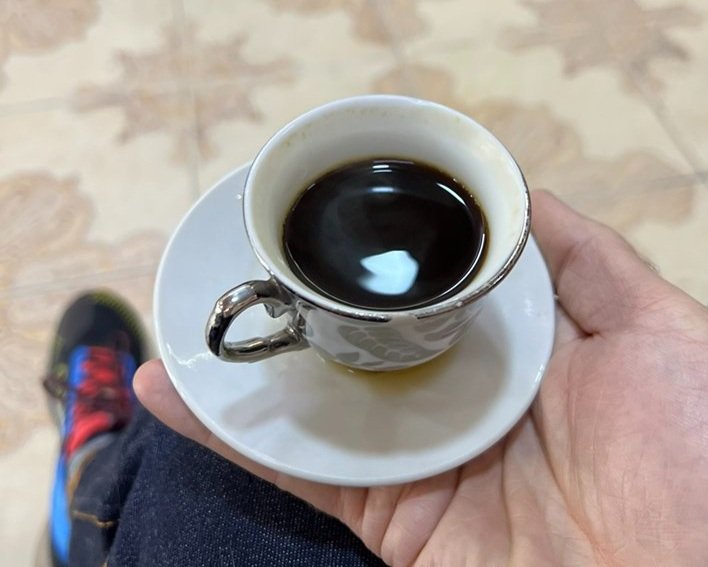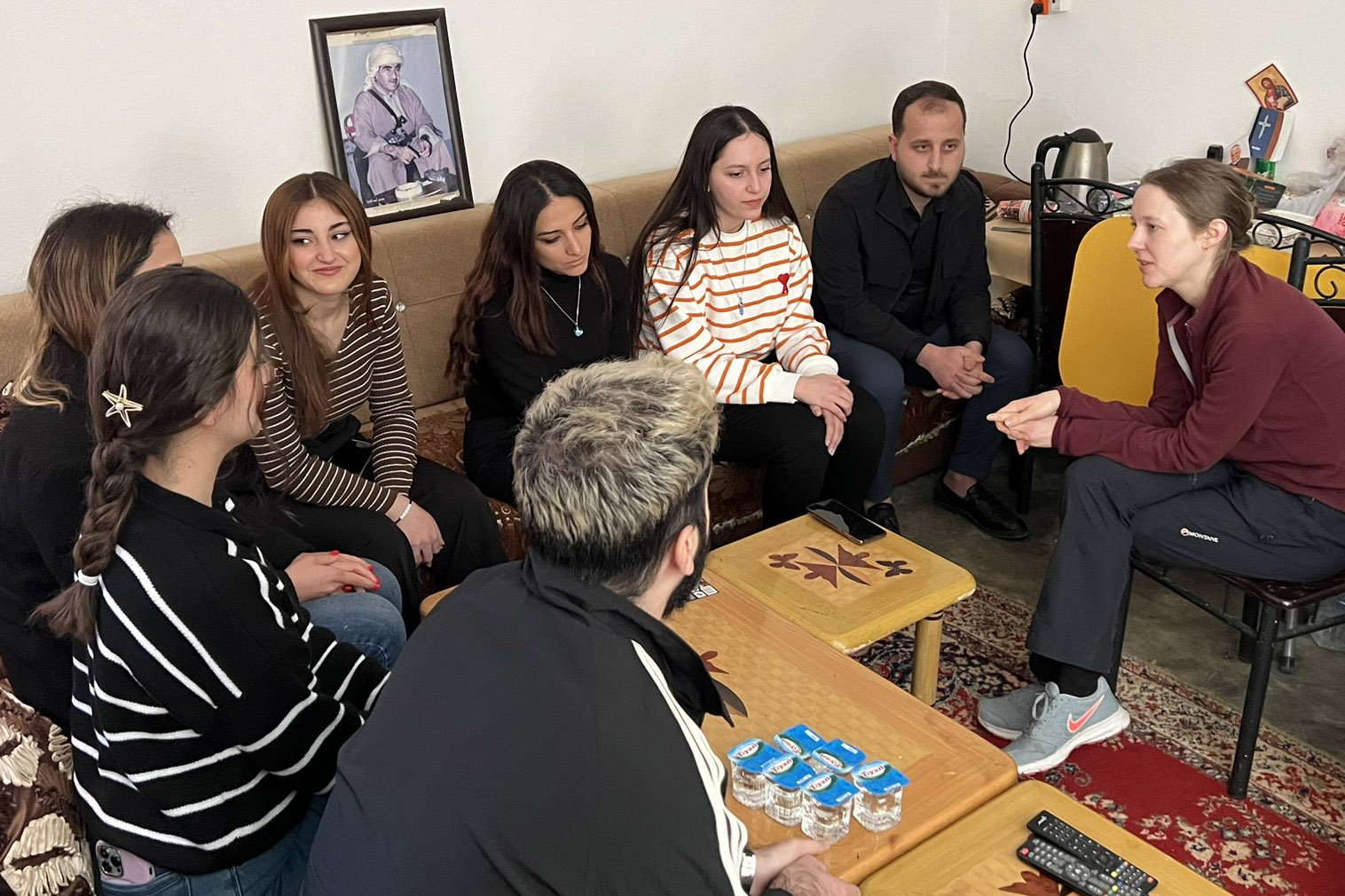Project update: Supporting livelihoods in Iraq
Finding a job in Iraq is incredibly difficult, as Kat from Embrace’s programmes and partnership team explains. In March (2024) she travelled to northern Iraq to visit a project that is providing small loans for fledgling business enterprises, supporting young entrepreneurs as they rebuild the economy of their country:
“Congratulations!” I replied, when a friend emailed to share the good news that he’d secured a job, after months of searching and applying. This struggle is familiar to many people I met during my recent trip to Northern Iraq, where approximately 60% of the working age population are not in paid work. Only about 10% of women participate in the labour force, while young men are twice as likely to be unemployed as older men. I met one man in his mid-twenties who had just completed his Masters in Erbil and was starting to look for a job. When I asked what kind of job he was seeking, he replied ‘in Iraq, we don’t get a choice’.
Of those who work, around 38% of people are employed in the public sector – working in the civil service or in government schools or hospitals. These jobs are often gained through connections, rather than solely on the basis of merit, excluding those without the necessary personal networks. The remainder work in the private sector, which is relatively small and underdeveloped. Apart from in the oil industry, which the government relies on for revenue, international companies are reluctant to operate in Iraq. This is partly due to its volatile history, as well as the complex bureaucracy required. Therefore, most private sector employment is in the informal economy –meaning activities with value, but which are not registered and paying taxes. Examples include market sellers, street hawkers, minibus drivers, construction workers, and domestic cleaners.
Research suggests that most people working in the informal economy aren’t in this kind of work by choice – they would prefer to be working in a formal setting. However, it is hard for entrepreneurs to access the money needed to create thriving businesses. That’s why the work of our partner CAPNI is so important. With our support, they provide business loans of around £3,000, plus smaller grants, to entrepreneurs. This enables them to start or grow their income-generating activities, creating more job opportunities in the process. In March I spent a day with CAPNI, visiting businesses in or run by residents of four Christian villages in the Zakho District.
Coffee at Gerwargis’ cafe.
We started the day with a cup of strong Iraqi tea at a café run by Gewargis* and his son Younan*, who live in a nearby village. They had used their loan to renovate the space, buying new seating and opening an upstairs area with an outdoor terrace. Gewargis admitted that business is tough post-Covid, and it was quiet when we visited. But in the evenings the café is popular with young men who come to watch football, and he hopes the renovated space will attract more customers.
Our next stop was a nearby car accessories shop run by Gbril*, also an inhabitant of one of the villages. His loan allowed him to purchase a special oven for drying out car lights when moisture has got inside them.
A loan from CAPNI meant Gbril was able to by a new drying oven for his car accessories shop.
As well as being a service which generates income in itself, offering it brings people into the shop where they might also buy something else from his range of products he stocks. Gbril showed us his Instagram page where he advertises, and as we left a couple of young men came in to enquire about having a new logo put onto their van.
Moving on, we met Behnam*. Having previously worked in a dry cleaner, he took out a loan from CAPNI in order to buy and renovate a shop of his own. He explained he is now recruiting for a tailor, to attract more custom.
Behnam took out a loan in order to buy and renovate a shop of his own.
Our next stop was a very small Christian village of just 38 families, down from a previous population of 80 families. Traditionally many people who lived in villages worked in agriculture, but this has become more difficult due to the impact of climate change causing hotter summers and drought.
The Christian village of Navkandala.
Sura* invited us into her home, to see the salon she had set up using a grant from CAPNI. Sura is 32 years old, and a single parent to two daughters who watched us shyly from the doorway. Her wider family have all emigrated. She used to work in a salon in the city of Zakho, but found that transportation to and from work each day was too expensive to make it worthwhile. With CAPNI’s help, for the last six months she has been operating out of her home instead. When I asked about the number of women in the village who worked, she told me she was the only one – but she hoped to inspire others.
Sura used her grant to open up her own beauty salon.
Another short trip in the car took us to a slightly larger village where Embrace has supported the building of a new water tank, which pipes clean water into all the homes in the village so people are not reliant on purchasing bottled water. It was great to see that since my last visit, the tank had been finished and was in use. Later in 2024, CAPNI will install a similar tank in the neighbouring village, replacing one which is in a poor state of repair. These investments in community infrastructure are really valued by the population, as Christian villages often feel forgotten by the authorities.
A newly built water tank.
We also met a group of young people who were working with CAPNI. As part of the project funded by Embrace, young people in each village are responsible for publicising the loans and grants, and receiving applications from people who are interested. As well as receiving a stipend for their work, the work experience is invaluable for young people, most of whom are university graduates struggling to find job opportunities. They took us on a walk around the village to meet some of the recipients. In a house on the edge of the village with stunning views of the surrounding hills, Matti* had used a loan to set up nine beehives in his garden. He explained that in September they should start producing honey, around 20kg in total, which he will sell.
As part of the project funded by Embrace, young people in each village are responsible for publicising the loans and grants.
With sweet things on our mind, it was fitting that our final stop was Serena’s* house. She welcomed us into her lounge, where the table was groaning with traditional cakes and treats. Serena’s husband is not able to work as much as he used to, due to illness, so a grant from CAPNI has enabled her to start a business baking for celebrations and events and thus contribute to their household expenses.
A grant from CAPNI has enabled Serena to start a baking business.
Our day started with tea and ended with cake – and in between, we had seen a range of creative and passionate business owners. With your support, CAPNI are providing the investment needed for people to create more stable futures for themselves and their communities. Thank you!
*names changed









